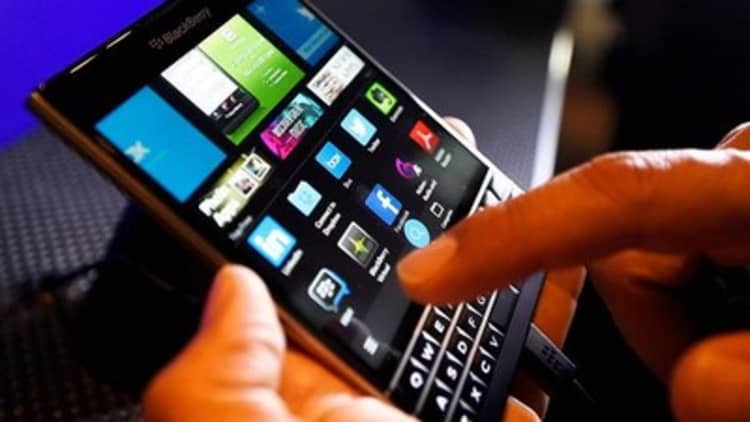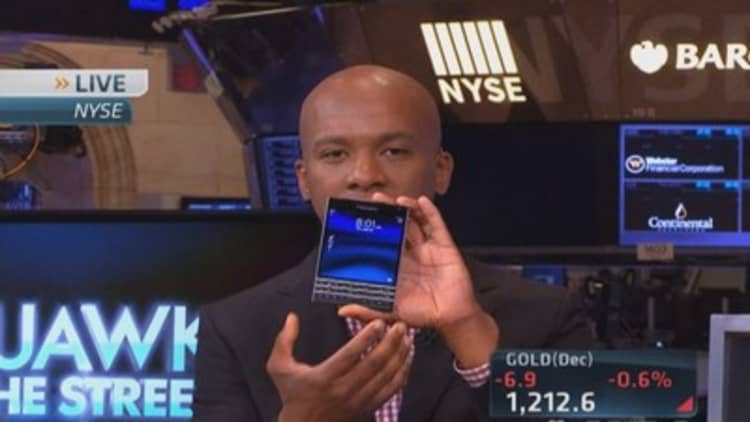
It's been quite a week for BlackBerry. From rumors (dispelled) of a potential Samsung takeover to the company tweeting (and then deleting) from a rival iPhone, the mobile email pioneer is finding new and sometimes unfortunate ways to stay relevant.
Coincidentally, Monday marks the 16th anniversary of the launch of the first BlackBerry. Powered by a 32-bit Intel processor and armed with a whopping 2 megabytes of flash memory, "it is designed to be wearable, operate 24 hours per day and run on a single AA alkaline battery," the company, then known as Research In Motion, said in a statement on Jan. 19, 1999.
The Waterloo, Ontario-based gadget maker rose from obscurity eventually to become not only Canada's most valuable company but an $80 billion global tech Goliath that was as well positioned as anyone for the rapid transition to a mobile world.
The story from there has been told and retold, but can really be condensed into a single word: iPhone. The introduction of Apple's touchscreen smartphone in 2007 kicked off a speedy race to bring powerful Web-enabled devices to consumers, going way beyond the emailers used by lawyers, bankers and business executives.
Read MoreSmartphone rivalry
By late 2012, Research In Motion had lost over 90 percent of its peak value, after repeatedly failing to challenge the iPhone and Google's Android in the suddenly massive smartphone market. And with more workers bringing their own favored phones into the office, companies were ripping out the big BlackBerry servers once used to manage the devices.
The two years since have been marred by a series of existential crises, replete with management shake-ups and take-private efforts. BlackBerry is so out of favor that websites track sightings of celebrities using them—to be funny.
BlackBerry, which became the official corporate name in 2013, sometimes does itself no favors. On Tuesday, the company's official Twitter account told its followers to download Twitter for BlackBerry to "keep up with the conversation."
The problem was that the tweet was sent from an iPhone, and an image was captured by The Verge before BlackBerry deleted it.
Despite such mishaps, along with recording net losses in six of the past seven quarters and seeing its global smartphone market share plunge to 0.5 percent, according to IDC, the stock price is up 75 percent since late 2013. The shares spiked 30 percent on Wednesday, on reports that Samsung was in talks to buy BlackBerry, and then plunged 20 percent on Thursday after both companies said no such discussions were underway.
Read MoreDid Blackberry, Samsung engage in takeover talks?
Colin Gillis, an analyst at BGC Partners, took the unusual step last month of upgrading BlackBerry shares to a buy rating. Only two other analysts tracked by FactSet are similarly bullish, while 18 recommend holding or selling the stock.
"While we view the company is in the early stage of turning the business around, management has built up a track record of credibility with investors over the last year by quickly reducing costs and preserving cash, focusing on its core strengths of security and physical keyboards, successfully launching new products, and forming strategic partnerships to fill the gaps," Gillis wrote on Dec. 17.

Gillis highlighted the Passport, a $600 square-screened smartphone that BlackBerry introduced in September. According to BlackBerry, the phone "is designed for a better web browsing, reading, apps, editing and maps experience." Gillis noted that the phone had an aggregate 4.8-star rating out of a possible 5 on Amazon.com. In December, BlackBerry unveiled the Classic, a faster and more powerful version of the traditional device with a physical keyboard.
In a statement to CNBC, BlackBerry CEO John Chen talked up the company's progress. "In just over a year we've made tremendous strides and our recent profitable quarter demonstrates the turnaround is right on track," Chen said.
Key to a revival at BlackBerry is its effort to resuscitate the enterprise business by working with all platforms, and proving its technology can manage iPhones, Android phones and Microsoft's Windows devices. That means competing with companies such as MobileIron, VMware's AirWatch unit and Good Technology. To that end, BlackBerry announced the BES12 last year, and said on its earnings call last month that Tata Power, Mackenzie Health and Bombardier are among businesses already using it.
Don't expect too much too soon. Even if BlackBerry hits its target of doubling software revenue to $500 million in fiscal 2016, it would only represent 15 percent of analysts' estimates for total annual sales.
Read MoreApple vs. Android: Who's winning?
Others following the stock are less optimistic than Gillis. On Monday, Mike Walkley of Canaccord Genuity kept his hold rating and lowered his fourth-quarter revenue estimate due in part to limited supply of the Passport and BlackBerry Classic.
Nomura Securities analyst Stuart Jeffrey, who also recommends holding the shares, wrote in December that momentum in BlackBerry's mobility management business is needed "to justify significant upside in fair value."
Such skepticism would have been unthinkable eight years ago, when BlackBerry was defining the future rather than hoping to be around for it. But considering how frequently BlackBerry has found itself the punchline of tech jokes in recent years, the fact that it's still valued at more than $5 billion suggests that perhaps the obituary was written a bit too soon.
As mobile industry analyst Maribel Lopez wrote in a Dec. 30 column for Forbes: "For a theoretically dying company, BlackBerry has been very busy."


